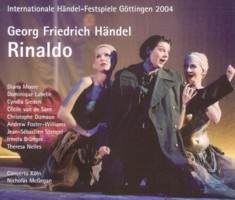Rinaldo
~
HWV 7a ~
|
|
Rinaldo: Diana Moore, soprano Concerto Köln (on period instruments) - Only available for purchase to members of the Göttinger Händel Gesellschaft
|
It is hard to remember that only five years ago there was no adequate CD recording of Rinaldo. This colourful live recording was made at the Göttingen Handel Festival in May 2004; however, each of the three recent recordings has faults. Christopher Hogwood’s tempi are always precise and judicious, but his recitative lacks drama, and the studio performance wears only a thin veil over its short concert tour origins, possessing no theatrical atmosphere at all. René Jacobs’ performance brims with the theatre, but his tempi are often willfully poor (“Or la tromba” is woefully miscalculated), instrumental phrasing is often sacrificed for the sake of contrived effects, a few shabby gimmicks from the staged production hung-over into the recording sessions, and Jacobs’ booklet essay is a disgraceful sham of the spirit of authenticity: organ continuo because Rinaldo is a Christian opera? Dreadful elongated cadences featuring unconvincing cello solos because Haym was too intelligent to have been content playing only two notes? Harp because Handel used it in Esther and Saul, both English oratorios composed years later? Jacobs’ attempt to pass this ridiculous codswallop off as credible musicology is not redeemed by his inconsistent artistic results, stimulating and frustrating in equal measure.
Nicholas McGegan is a reliable Handelian like Christopher Hogwood, but theatrical and expressive enough to match anybody. Better still, McGegan is infinitely more natural than Jacobs’ - although this performance features castanets and intrusive la-la-ing from the sirens similar to Jacobs’ tinkering at its worst. This seems out of character for the normally dependable McGegan, but perhaps it owes something to the erratic unsympathetic staging by director Igor Folwill (maybe Folwill used Jacobs’ recording to research his concept). The biggest problem with this new version is Folwill’s cuts to recitative and dramatic action, especially in Act III, and notably every time Armida is supposed to do something actively evil.
Folwill’s staging seriously damaged Rinaldo, so it is curious that the live recording is persuasive. The recorded sound is excellent, Concerto Köln’s playing is exciting, and McGegan delivers the music with his usual sense of humour, alert dramatic pacing, and infectious springy rhythms. The only blemishes are footsteps on the Stadthalle’s makeshift stage (including a frantic burst of comic activity during all the harpsichord solos in “Vo far Guerra”), frequent audience applause, and the occasional distant contribution from singers with their backs to the microphone.
Hogwood has the best cast, while Jacobs persuades his comparably talented group to get more involved with the plot. The Göttingen cast is less even. Cyndia Sieden is weak as Almirena, although her ‘Lascia ch’io pianga’ is less contrived than Cecilia Bartoli’s over-egged pudding (Hogwood). Diana Moore has an attractive real contralto voice, and, although her characterization seems to need a few years to grow in dramatic stature, she was not helped by Folwill’s terrible production. Moore delivers Rinaldo’s big moments (“Cara sposa”, “Venti turbini”, “Or la tromba”) with attractive musical panache, and I am sure she will be a Handel performer of notable distinction.
The temperature rises whenever the plot turns its attention to Andrew Foster-Williams and Dominique Labelle. Of course, one could argue this is because the pagan duo’s evil shenanigans are a lot more fun than the virtuous characters, but McGegan’s performance always becomes more thrilling when Armida and Argante are the centre of the action. Labelle’s Armida is tempestuous, sexy, and explosive: her “Ah! crudel” is one of the most moving interpretations I have heard, and one can sense her enjoyment of “Vo far Guerra”. Foster-Williams makes a spectacular entry amidst a flurry of powerful coloratura and blazing military trumpets (no studio editing or engineer’s gloss here – the coloratura is 100% genuine and utterly amazing), but he also excels in the lyrical “Vieni, o cara”.
This is not the most consistent Rinaldo available on CD, and Hogwood is still the safest version. Nevertheless, I will certainly listen to McGegan’s performance more often because it takes more risks than Hogwood, and is an intelligent and stylistically plausible alternative to the hit-and-miss maverick Jacobs. There are moments in this live performance that make me wish that McGegan and a slightly better balanced cast had devoted their talents to a complete studio recording. Then again, perhaps it is the elusive sense of spontaneity and musical wit that makes McGegan’s interpretation of Rinaldo more entertaining than any other on disc.

